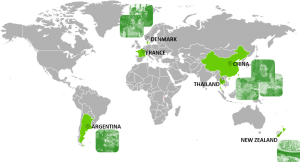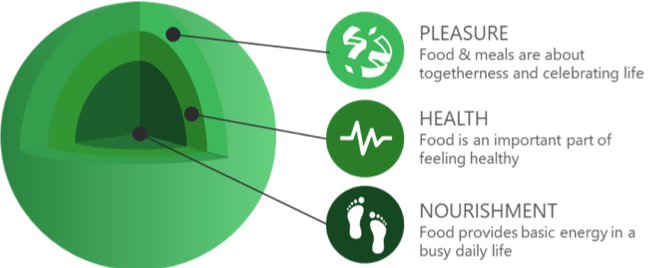
Levels of meat supply have risen dramatically over the last decades according to the United Nations Food & Agriculture Organisation1.
However, according to Greenpeace, the organization behind this research, the consumption of meat is associated with many negative effects on our climate and environment as well as on our health, such as obesity, cardiovascular diseases, type-2 diabetes and several cancer types. Greenpeace hence identified the crucial need to change people’s behaviour for a better health, climate and environment in the future.
Decreasing meat consumption requires extensive knowledge of the role of meat in the society and of how to motivate a change of habits.
To be able to successfully promote a decrease in meat consumption Greenpeace first needed to gain an understanding of the cultural connotations of meat and current eating habits to then be able to identify strategies that could lead to a shift in consumption patterns – having in mind that the final goal is a change in mindsets and habits rather than only short-term behavioural changes.
To understand the role of meat and derive promising strategies, Danish market research consultancy Epinion conducted an explorative cross-country study using a mobile ethnography platform. The study focused on uncovering the complex and varying local perceptions, traditions, emotions and behavioural patterns surrounding meat consumption that can be expected to affect the potential for changing dietary habits. The end goal of the research project was to create input for a campaign with global appeal whilst allowing for local adaptions to ensure maximum impact.

The study included 62 consumers from 6 countries (Argentina, China, Denmark, France, New Zealand and Thailand), representing various cultural dimensions as well as different patterns in meat consumption. The group of participants covered families as well as singles and couples that were identified as the target group in the screening process.
Meat plays a lead role in meals across the world because it is seen to satisfy essential needs.

The study confirmed that what people eat and under which circumstances holds numerous meanings across countries. There are overall three “layers” in which to understand the “meaning” of food and meat.
In a busy life, meat is chosen because it is an accessible, cheap, easy and fast way to provide oneself and the family with nourishment. Furthermore, in many cultures meat is considered essential for a healthy diet and is, not least, strongly associated with indulgence and hospitality.
The study identified a lack of knowledge and awareness of the societal and personal implications as the first obstacles that must be overcome to reduce meat consumption.
The fear that a reduction of meat in the daily diet would decrease the quality of life, as well as the lack of ideas regarding how to operationalize a decrease in meat consumption in daily life, has been diagnosed as a further barrier.
To trigger attention, the campaign had to create a strong sense of urgency in a way that empowers people to act and highlights the personal benefits of changing dietary patterns.
Greenpeace always had a reputation for confronting those in positions of power with their responsibilities – often through interventions to stop an immediate environmental wrong right there at the scene. But this time another approach was needed: one that raises the awareness and changes the actions of the general population.
This study provided the NGO with clear and practical guidelines on how the need for a reduction in meat can be made comprehensible and relevant to a broad audience. With insights into the behavioural patterns and attitudes of the general population as the starting point the study clarified that abstract problems must be addressed with tangible measures that allow people to take the steps towards a healthier planet that are relevant and realistic in their specific cultural context.
Since completing this research project in 2017 Greenpeace has implemented a variety of local and global initiatives.
All of them, including the global ‘Less Meat More Life’ campaign, play into the identified behavioural patterns and barriers. The ‘Less Meat more Life’ campaign encourages a better life though less meat, rather than shaming people for their current lifestyles. It also provides concrete strategies that translate the overall aim into everyday actions, empowering people to make changes in their daily habits and their local communities, e.g. by providing appealing recipes that help people to easily include more plants in their diet.

With this research project, Greenpeace has therefore taken a crucial first step towards ensuring their ability to create lasting change and impact globally. With the gained knowledge Greenpeace was able to improve their communication to ensure it will not simply speak to their existing supporters, but also to the millions of people who are not naturally engaged in politics or the preservation of the environment.
At the time of writing 259.915 people have actively joined the Greenpeace campaign.
- UN Food & Agriculture Organisation. 2018. FAO. [ONLINE] Available: http://www.fao.org. [Accessed 28 June 2018].
About the Authors:
Antonia Dedekind, Manager, Epinion
Helena Linde Pedersen, Senior Consultant, Epinion
